中考冲刺英语常见语法汇总
- 格式:doc
- 大小:94.50 KB
- 文档页数:20
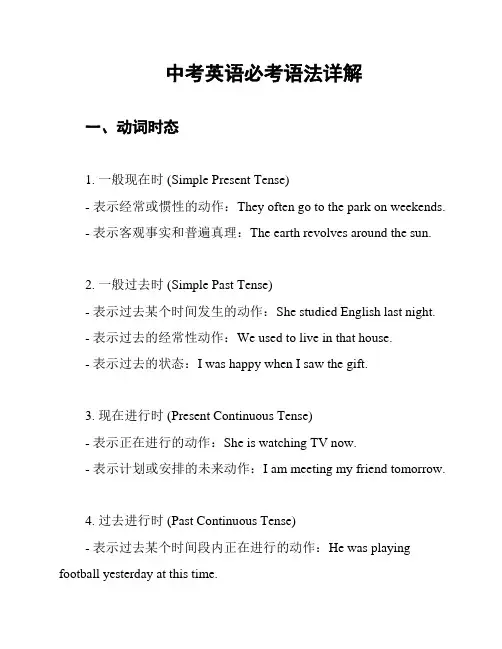
中考英语必考语法详解一、动词时态1. 一般现在时 (Simple Present Tense)- 表示经常或惯性的动作:They often go to the park on weekends.- 表示客观事实和普遍真理:The earth revolves around the sun.2. 一般过去时 (Simple Past Tense)- 表示过去某个时间发生的动作:She studied English last night.- 表示过去的经常性动作:We used to live in that house.- 表示过去的状态:I was happy when I saw the gift.3. 现在进行时 (Present Continuous Tense)- 表示正在进行的动作:She is watching TV now.- 表示计划或安排的未来动作:I am meeting my friend tomorrow.4. 过去进行时 (Past Continuous Tense)- 表示过去某个时间段内正在进行的动作:He was playing football yesterday at this time.5. 现在完成时 (Present Perfect Tense)- 表示过去发生的与现在有联系的动作或状态:He has already finished his homework.6. 过去完成时 (Past Perfect Tense)- 表示过去某个时间点之前已经发生的动作或状态:She had already left when I arrived.7. 将来时 (Future Tense)- 表示将来要发生的动作或存在的状态:I will go to Beijing next week.二、被动语态1. 被动语态的构成:be + 过去分词- 主动语态:Tom eats an apple.- 被动语态:An apple is eaten by Tom.2. 被动语态的使用:- 强调动作的承受者:The book is written by a famous author.- 不知道或没有必要知道动作的执行者:The door was broken yesterday.三、情态动词1. can / could- 表示能力或许可:I can swim very well.- 表示请求或建议:Could you open the window, please?2. may / might- 表示允许或可能:You may go home now.3. must- 表示必须或肯定:She must finish her assignment by tomorrow.4. shall / should- 表示将要或应该:We should keep the classroom clean.四、倒装句1. 把助动词或情态动词提前,主语放在动词之后:- Never have I seen such a beautiful sunset.- Only after he left did I realize my mistake.2. 用于表示地点、方向、时间等状语提前:- At the top of the mountain stands a little cottage.- In front of the house is a beautiful garden.五、定语从句1. 定语从句用来修饰一个名词或代词,用以给出更多的信息。
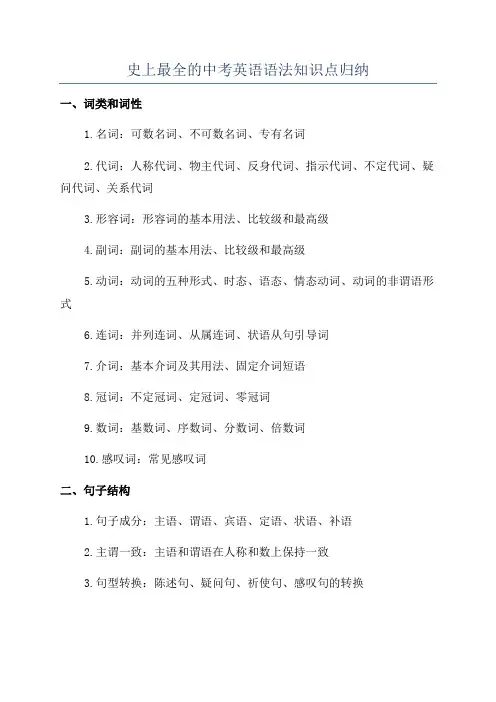
史上最全的中考英语语法知识点归纳一、词类和词性1.名词:可数名词、不可数名词、专有名词2.代词:人称代词、物主代词、反身代词、指示代词、不定代词、疑问代词、关系代词3.形容词:形容词的基本用法、比较级和最高级4.副词:副词的基本用法、比较级和最高级5.动词:动词的五种形式、时态、语态、情态动词、动词的非谓语形式6.连词:并列连词、从属连词、状语从句引导词7.介词:基本介词及其用法、固定介词短语8.冠词:不定冠词、定冠词、零冠词9.数词:基数词、序数词、分数词、倍数词10.感叹词:常见感叹词二、句子结构1.句子成分:主语、谓语、宾语、定语、状语、补语2.主谓一致:主语和谓语在人称和数上保持一致3.句型转换:陈述句、疑问句、祈使句、感叹句的转换4.句子的简单句、并列句、复合句、复合句类型(定语从句、状语从句、宾语从句)三、时态和语态1.一般现在时2.一般过去时3.现在进行时4.过去进行时5.一般将来时6.一般过去将来时7.现在完成时8.过去完成时9.现在完成进行时10.一般过去完成进行时11.被动语态四、非谓语动词1.不定式2.动名词3.动词-ing形式五、虚拟语气1.与事实相反的虚拟语气:与现在事实相反的虚拟语气、与过去事实相反的虚拟语气2.与将来事实相反的虚拟语气3.与现在条件相反的虚拟语气4.与过去条件相反的虚拟语气六、定语从句1.关系代词引导的定语从句2.关系副词引导的定语从句3.定语从句的嵌套七、状语从句1.时间状语从句2.地点状语从句3.方式状语从句4.原因状语从句5.条件状语从句6.比较状语从句7.目的状语从句8.结果状语从句八、宾语从句1.宾语从句的引导词2.宾语从句的位置九、名词性从句1.主语从句2.宾语从句3.表语从句十、情态动词1.can和could2.may和might3.will和would4.shall和should5.must和have to6.need和dare以上是中考英语语法知识点的简要归纳,更详细的内容需要根据课本和学习资料进行学习和理解。

中考语法重点梳理总结语法是中考英语考试的重要组成部分,掌握好语法知识对于考生取得好成绩非常关键。
本文将对中考语法的重点进行梳理和总结,帮助考生快速复习和掌握这些知识点。
一、基础语法知识点1. 时态- 一般现在时:用法、肯定句、否定句、疑问句;- 现在进行时:用法、构成、肯定句、否定句、疑问句;- 一般过去时:用法、构成、肯定句、否定句、疑问句;- 过去进行时:用法、构成、肯定句、否定句、疑问句;- 一般将来时:用法、构成、肯定句、否定句、疑问句。
2. 从句- 名词性从句:主语从句、宾语从句、表语从句;- 定语从句:关系代词和关系副词的用法,先行词的指代问题;- 状语从句:时间状语从句、地点状语从句、目的状语从句、方式状语从句、条件状语从句。
3. 基本句型- 主谓结构:主语和谓语的一致性;- 主谓宾结构:动宾搭配、及物动词和不及物动词; - 主系表结构:系动词的用法、表语的形式。
二、常见错误类型及纠正方法1. 词性错误- 形容词和副词的用法区别;- 名词和动词的转化。
2. 时态错误- 部分考生容易混淆不同时态的用法;- 注意句子的上下文语境,选择正确的时态。
3. 代词错误- 指代不明确,造成语义模糊;- 注意先行词和代词在语法和逻辑上的一致性。
4. 介词错误- 介词搭配的固定搭配用法;- 注意特殊动词和介词的搭配。
三、复合句的连接词1. 并列连接词- and, but, or, so等的用法和区别;- 注意使用上的逻辑连贯和前后句之间的平衡。
2. 引导性连接词- because, if, when, while等的用法;- 注意从句与主句之间的逻辑关系。
3. 状语连接词- before, after, since等的用法;- 理解并正确运用时间、地点和条件等状语从句。
四、易混淆的语法知识点1. 动词时态和语态的区别;2. 定语从句和状语从句的区别;3. 直接引语和间接引语的句式转换。
五、巩固方法与技巧1. 多做语法练习题,掌握各类语法知识的运用;2. 利用语法书籍和教辅材料进行针对性的学习;3. 多听、多读、多写,培养语感和理解能力。

初三英语中考重点语法:一、时态1.一般现在时-用法:表示经常发生的动作或存在的状态;表示客观事实、真理等。
-标志词:always, usually, often, sometimes, every day/week/month/year 等。
-结构:主语+动词原形(当主语为第三人称单数时,动词用第三人称单数形式)。
2.一般过去时-用法:表示过去某个时间发生的动作或存在的状态。
-标志词:yesterday, last week/month/year, ago, in +过去的年份等。
-结构:主语+动词的过去式。
3.一般将来时-用法:表示将来某个时间要发生的动作或存在的状态。
-标志词:tomorrow, next week/month/year, in the future 等。
-结构:will +动词原形;be going to +动词原形。
4.现在进行时-用法:表示现在正在进行的动作。
-标志词:now, at the moment, look, listen 等。
-结构:be +动词的现在分词。
5.过去进行时-用法:表示过去某个时刻正在进行的动作。
-标志词:at that time, at +过去的时间点等。
-结构:was/were +动词的现在分词。
6.现在完成时-用法:表示过去发生的动作对现在造成的影响或结果;表示从过去一直持续到现在的动作或状态。
-标志词:already, yet, just, ever, never, since +时间点,for +时间段等。
-结构:have/has +动词的过去分词。
二、被动语态1.一般现在时的被动语态:am/is/are +过去分词。
2.一般过去时的被动语态:was/were +过去分词。
3.一般将来时的被动语态:will be +过去分词;be going to be +过去分词。
4.现在完成时的被动语态:have/has been +过去分词。
三、宾语从句1.引导词:that(在口语或非正式文体中可省略),if/whether(是否),特殊疑问词(what, who, when, where, why, how 等)。

史上最全的中考英语语法必考知识点大全
一、时态
1.一般现在时:叙述现在地基本情况及习惯性动作,主动形式表示现在状态或现在客观存在的事实。
2.一般过去时:表示过去其中一时间发生的动作和存在的状态。
3.现在完成时:表示从过去其中一时间开始,一直延续到现在的动作或状态。
4.现在进行时:表示此刻正在发生的动作或存在的状态。
5.一般将来时:表示将来其中一时刻或其中一段时间内发生的动作或存在的状态。
6.过去将来时:表示过去时预计或计划将来要发生的动作或存在的状态。
7.状语从句中的时态:
(1)主句是一般现在时,从句一般用一般现在时;
(2)主句是一般过去时,从句一般用一般过去时;
(3)主句是一般将来时,从句一般用一般将来时;
(4)主句是现在完成时,从句一般用过去将来时。
二、句法结构
1.主谓一致:谓语动词表达的动作所发生的时间和主语之间是一致的关系。
2.主语从句:即用疑问词引导的从句,其主语在句中充当整个句子或者句子成分的主语。
3.主谓宾:即主语、谓语动词和宾语三部分的句子结构。
4.定语从句:即用关联词引导的附加句,其作用是对主句中的一些名词或代词进行补充说明。
5.宾语从句:即用从属连词引导的从句,其作用是把从句的内容作为宾语放在动词后面。

必考语法大全-中考英语1. 时态- 现在时:用于陈述客观事实、经常性动作、普遍真理等。
- 一般现在时:He often plays soccer.- 现在进行时:She is reading a book right now.- 现在完成时:I have finished my homework.- 过去时:用于过去发生的动作或状态。
- 一般过去时:We visited the museum last Sunday.- 过去进行时:They were playing basketball when it started raining.- 过去完成时:She had already left when I arrived.- 将来时:用于表示将来发生的动作或状态。
- 一般将来时:I will go to the party tomorrow.- 将来进行时:She will be watching a movie at this time next week.2. 祈使句- 用于发出命令、请求或建议。
- 一般祈使句:Open the window, please.- 否定祈使句:Don't be late for school.3. 条件句- 用于表达假设条件和结果。
- 条件句类型一:If it rains, we will stay at home.- 条件句类型二:If I had more money, I would buy a new car. - 条件句类型三:I will help you if you need any assistance.4. 定语从句- 用于给名词或代词增加修饰信息。
- 关系代词:that, which, who, whom, whose- 关系副词:when, where, why- That is the book that I borrowed from the library.5. 状语从句- 用于说明动作发生的条件、原因、方式、时间等。
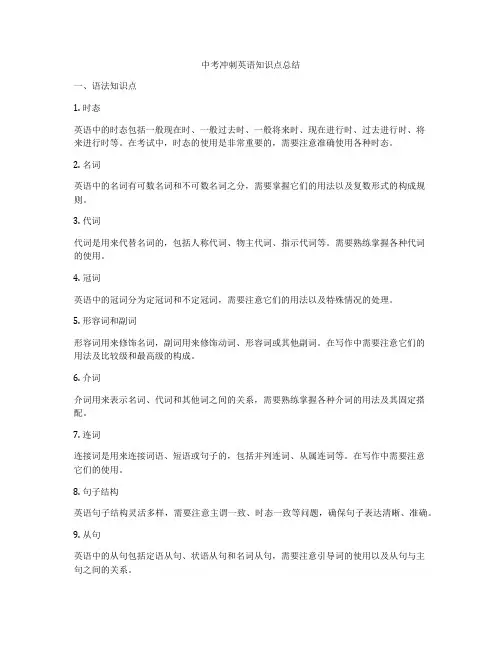
中考冲刺英语知识点总结一、语法知识点1. 时态英语中的时态包括一般现在时、一般过去时、一般将来时、现在进行时、过去进行时、将来进行时等。
在考试中,时态的使用是非常重要的,需要注意准确使用各种时态。
2. 名词英语中的名词有可数名词和不可数名词之分,需要掌握它们的用法以及复数形式的构成规则。
3. 代词代词是用来代替名词的,包括人称代词、物主代词、指示代词等。
需要熟练掌握各种代词的使用。
4. 冠词英语中的冠词分为定冠词和不定冠词,需要注意它们的用法以及特殊情况的处理。
5. 形容词和副词形容词用来修饰名词,副词用来修饰动词、形容词或其他副词。
在写作中需要注意它们的用法及比较级和最高级的构成。
6. 介词介词用来表示名词、代词和其他词之间的关系,需要熟练掌握各种介词的用法及其固定搭配。
7. 连词连接词是用来连接词语、短语或句子的,包括并列连词、从属连词等。
在写作中需要注意它们的使用。
8. 句子结构英语句子结构灵活多样,需要注意主谓一致、时态一致等问题,确保句子表达清晰、准确。
9. 从句英语中的从句包括定语从句、状语从句和名词从句,需要注意引导词的使用以及从句与主句之间的关系。
10. 名词性从句名词性从句包括主语从句、宾语从句、表语从句和同位语从句,需要掌握它们的用法及注意引导词的选择。
11. 形容词性从句形容词性从句是用来修饰名词的从句,需要注意其引导词和从句的构成。
12. 倒装句倒装句是英语中的一种特殊句型,需要在考试中灵活运用,注意句子的语序和基本结构。
13. 虚拟语气虚拟语气是英语中的一种特殊语气,包括与过去事实相反的虚拟和与将来的不可能实现的虚拟。
需要掌握虚拟条件句和虚拟结果句的构成及使用。
14. 名词性名词性包括名词、代词、数词和连词等,需要注意它们的分类及用法。
15. 动词性动词性包括动词、形容词、副词等,需要注意它们的分类及用法。
16. 形容词性形容词性包括形容词、数词、代词等,需要注意它们的分类及用法。

中考英语常考的50个语法知识点1. 一般现在时:表示现在的普遍状况或习惯性动作,如:He often goes to school by bike.2. 一般过去时:表示过去发生的动作或存在的状态,如:He went to school by bus yesterday.3. 一般将来时:表示将来发生的动作或存在的状态,如:He will go to school by car tomorrow.4. 现在完成时:表示从过去其中一时间延续到现在为止的动作或状态,如:He has gone to school by train for three years.5. 现在进行时:表示正在进行的动作,如:He is going to school by subway now.6. 过去将来时:表示过去将来发生的动作或存在的状态,如:He was going to go to school by bus the next day.7. 一般疑问句:用一般疑问句来询问,如:Do you go to school by bike?8. 特殊疑问句:用特殊疑问句来询问,如:What did he go to school by yesterday?9. 肯定句:用肯定句表达事实,如:He goes to school by car.10. 否定句:用否定句表达事实,如:He doesn't go to school by bike.11. 祈使句:用祈使句表达请求或命令,如:Go to school by subway.12. 动词的一般式:表示一般的动作或状态,如:He goes to school by bus.13. 动词的原形:表示基本的动作,如:He go to school by train.14. 动词的现在分词:表示正在进行的动作,如:He is going to school by bike.15. 动词的过去分词:表示过去发生的动作,如:He went to school by car.16. 动词的第三人称单数形式:表示人的动作或状态,如:He goes to school by bike.17. 不定式:表示未完成的动作,如:He wanted to go to school by bus.18. 名词的复数形式:表示多个名词,如:Those buses are going to school.。

中考英语24个必考语法知识点中考是一个非常重要的考试,在中考中有许多重要的英语语法知识点,需要考生准备好。
下面将介绍中考英语中必考的24个语法知识点,供考生参考。
1、冠词:用于单数可数名词前,分为不定冠词(a,an)和定冠词(the),an表示单数可数名词的音音素开头,a表示单数可数名词除音音素开头外所有其他情况,the表示特定范围。
2、代词:代替句子中某些名词,可以称为代词,如I,you,he,she,it,we,they,his,her,their,ours,yours,that,this,these,those。
3、名词:名词是动词的补语,可以表示一个人,一件事物,一个地方,一种情况等,可以用一个单词表达,如car,chair,school,problem等。
4、形容词:用来修饰名词,表示名词的特征、性质、状态和质量等,如nice,beautiful,good,bad,big,small,well。
5、副词:修饰动词,表示动作的时间、地点、程度、方式等,如now,yesterday,soon,gently,quickly,very。
6、介词:表示一个短语和另一个短语之间的关系,一般放在句子中的前面,如in,on,at,by,for,with,of,against,between。
7、动词:表示动作或者状态的词,如run,walk,jump,eat,be,swim,work,study等。
8、连词:连接两个句子,一般用and,or,but,so,if,because,while等。
9、情态动词:表示说话者对说话内容的态度,如can,must,may,need,ought,shoould,would,will,could等。
10、定语从句:用来修饰名词的从句,一般包括时间、地点、原因,如the book which I bought yesterday,the man who lives next door。
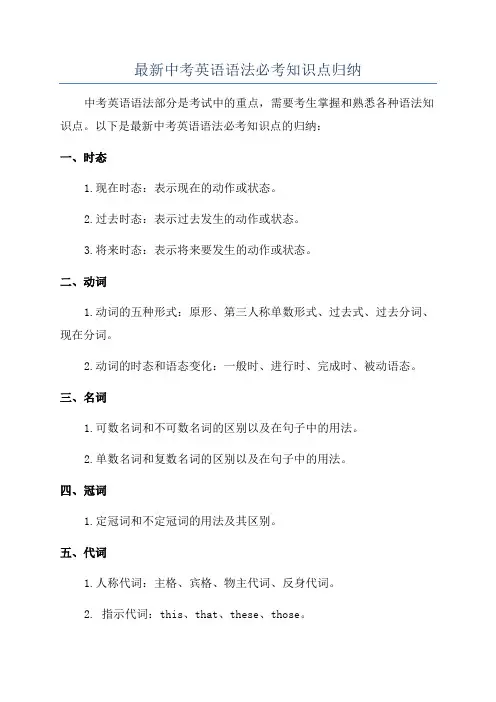
最新中考英语语法必考知识点归纳中考英语语法部分是考试中的重点,需要考生掌握和熟悉各种语法知识点。
以下是最新中考英语语法必考知识点的归纳:一、时态1.现在时态:表示现在的动作或状态。
2.过去时态:表示过去发生的动作或状态。
3.将来时态:表示将来要发生的动作或状态。
二、动词1.动词的五种形式:原形、第三人称单数形式、过去式、过去分词、现在分词。
2.动词的时态和语态变化:一般时、进行时、完成时、被动语态。
三、名词1.可数名词和不可数名词的区别以及在句子中的用法。
2.单数名词和复数名词的区别以及在句子中的用法。
四、冠词1.定冠词和不定冠词的用法及其区别。
五、代词1.人称代词:主格、宾格、物主代词、反身代词。
2. 指示代词:this、that、these、those。
3. 不定代词:some、any、no、every、each等。
六、形容词和副词1.形容词的用法及其在句子中的位置。
2.形容词的比较级和最高级的构成及用法。
3.副词的用法及其在句子中的位置。
七、介词1.常见的介词及其用法。
2.介词短语在句子中的作用。
八、连词1.并列连词及其连接的句子。
2.从属连词及其连接的句子。
九、虚拟语气1.虚拟语气的用法及其在条件句中的表示。
十、直接引语和间接引语1.直接引语和间接引语的区别及其在句子中的用法。
十一、固定搭配和常见短语1.固定搭配和常见短语的用法及其在句子中的位置。
以上是最新中考英语语法必考知识点的归纳,考生需要通过学习和积累这些知识点,提升自己的语法水平,从而在考试中取得好成绩。
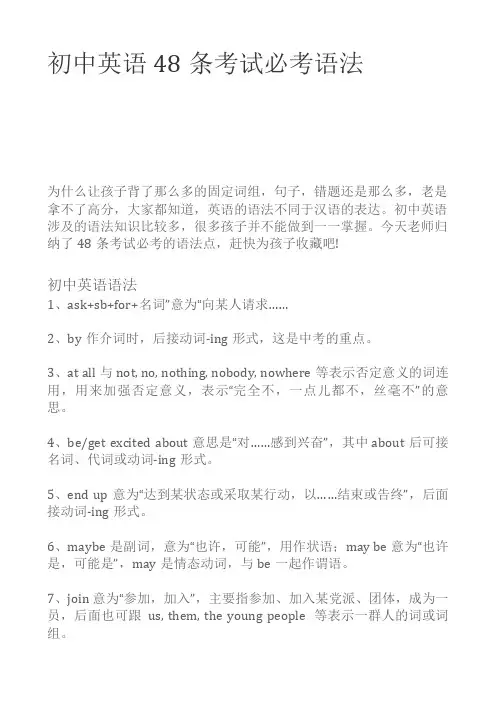
初中英语48条考试必考语法为什么让孩子背了那么多的固定词组,句子,错题还是那么多,老是拿不了高分,大家都知道,英语的语法不同于汉语的表达。
初中英语涉及的语法知识比较多,很多孩子并不能做到一一掌握。
今天老师归纳了48条考试必考的语法点,赶快为孩子收藏吧!初中英语语法1、ask+sb+for+名词”意为“向某人请求……2、by作介词时,后接动词-ing形式,这是中考的重点。
3、at all与not, no, nothing, nobody, nowhere等表示否定意义的词连用,用来加强否定意义,表示“完全不,一点儿都不,丝毫不”的意思。
4、be/get excited about意思是“对……感到兴奋”,其中about后可接名词、代词或动词-ing形式。
5、end up意为“达到某状态或采取某行动,以……结束或告终”,后面接动词-ing形式。
6、maybe是副词,意为“也许,可能”,用作状语;may be意为“也许是,可能是”,may是情态动词,与be一起作谓语。
7、join意为“参加,加入”,主要指参加、加入某党派、团体,成为一员,后面也可跟us, them, the young people等表示一群人的词或词组。
8、take part in也意为“参加,加入”,指参加群众性的活动、会议、考试、竞赛等。
9、begin with意为“以……开始”,其后接动词时应用动词-ing形式。
10、短语first of all意为“首先,第一”,在句中作状语,强调首要的事情是什么,不一定用于列举,常用于first of all……, then……, at last……,使说明的层次更清楚,a lot还可作“经常,常常”解,相当于often。
11、one of意为“(……中的)一个”,其后接名词的复数形式,如有形容词修饰名词时,形容词要用最高级。
12、deal with作“与……打交道”,“与……做买卖”解时,主语通常是人、公司、商店等。
中考英语语法必考知识点归纳
中学英语语法是学生在中考中必须掌握的重要内容之一、掌握好语法
知识对于学生提高英语的整体能力和成绩至关重要。
下面是中考英语语法
必考知识点的归纳总结。
1.时态
2.人称
3.被动语态
被动语态在中考英语语法中也经常出现。
被动语态是主语是动作的承
受者而不是执行者的句子。
学生需要掌握被动语态的构造和使用。
4.定冠词和不定冠词的用法
5.名词的单复数形式
在中考英语语法中,名词的单复数形式也是考生需要掌握的重要内容。
一般情况下,可数名词用复数形式表示数量,不可数名词用单数形式表示
数量。
6.动词的时态和语态
7.形容词和副词的用法
在中考英语语法中,形容词和副词的用法也是考生需要注意的内容。
形容词修饰名词,副词修饰动词、形容词或副词。
8.句子成分的基本概念
在中考英语语法中,还需要学生理解句子成分的基本概念。
句子成分
包括主语、谓语、宾语、表语、定语和状语等。
9.非谓语动词的用法
10.并列句和复合句的转换
在中考英语语法中,还会考察并列句和复合句的转换。
学生需要掌握
并列句和复合句的构造和转换方法。
总结起来,中考英语语法必考知识点主要包括时态、人称、被动语态、冠词的用法、名词的单复数形式、动词的时态和语态、形容词和副词的用法、句子成分的基本概念、非谓语动词的用法以及并列句和复合句的转换。
掌握这些知识点将有助于学生在中考英语中取得更好的成绩。
通过大量的
练习和实践,学生可以更好地掌握这些知识点,提高自己的语法水平。
中考英语常考的50个语法知识点1. be made of 由……制成(制成以后还看得见原材料)2. be not sure 表不确定3. be on a visit to 参观4. be popular with sb 受某人欢迎5. be quiet 安静6. be short for 表… 的缩写7. be sick in bed 生病在床8. be sorry to do sth对所做的某事感到遗憾9. be sorry to hear that很遗憾听到10. be sorry to trouble sb麻烦某人感到抱歉11. be strict in doing sth严于做某事12. be strict with sb 对某人要求严格13. be strict with sb in sth 某方面对某人严格14. be supposed to do 应该做某事15. be sure 表确定16. be sure of doing sth 对做某事有信心17. be sure of sth 对做某事有信心18. be sure that 对…有信心19. be sure to do sth一定会做某事20. be terrified of + 名/动doing 害怕……21. be terrified to do sth害怕做某事22. be the same as … 和什么一样23. be used to doing sth 习惯做某事24. be worth doing 值得做25. be(feel)afraid to do sth 害怕做某事26. because+句子because of +短语27. begin to do = start to do 开始做某事28. between…and… 两者之间29. borrow sth from sb 向……借……30. both = the same(as)= not different(from)表相同31. bother sb to do sth打扰某人做某事32. by the end of 到……为止33. call sb sth34. care for关心35. catch up with sb 赶上某人36. chat with sb 和某人闲谈37. come in 进38. come over to 过来39. come up with 提出40. communicate with sb 和某人交流41. consider + doing 考虑做什么42. dance to 随着……跳舞43. decide to do sth 决定做某事44. do a survey of 做某方面的调查45. do better in 在……方面做得更好46. do wrong 做错47. Don’t forget to do sth 不要忘了做某事48. Don’t mind +doing /从句/名词不要介意…49. each +名(单)每一个…50. enjoy +doing 喜欢。
中考英语语法必考知识点大全
一、名词
1.名词的定义和分类
2.可数名词和不可数名词
3.数词和运用
4.名词所有格的表达
二、代词
1.人称代词的主格和宾格
2.物主代词的形式及其用法
3.反身代词的形式及其用法
4.不定代词的形式及其用法
三、形容词和副词
1.形容词的用法和比较等级
2.形容词性物主代词和名词性物主代词的区别
3.副词的分类和用法
4.副词的比较级和最高级
四、动词
1.动词的分类
2.动词的时态和语态
3.动词的不定式和动名词
4.动词的时态一致性和被动语态的转换
五、介词和介词短语
1.常见介词的用法
2.介词短语的位置及其修饰词的位置
六、连词和从句
1.并列连词和转折连词的用法
2.陈述句、祈使句和疑问句
3.陈述句的宾语从句和主语从句
4.特殊疑问句和宾补从句
七、时态和语态
1.一般现在时、一般过去时、一般将来时的构成和用法
2.现在进行时、过去进行时、将来进行时的构成和用法
3.现在完成时、过去完成时、将来完成时的构成和用法
4.一般现在时、一般过去时和一般将来时的被动语态的转换和用法
八、情态动词
1. can, could, may, might的用法
2. must, have to, need to的用法
3. should, ought to, shall的用法
4.情态动词在疑问句和否定句中的用法
九、固定搭配
1.动词与介词的固定搭配
2.形容词与副词的固定搭配
3.名词与介词的固定搭配
4.动词短语的固定搭配。
中考英语24个必考语法知识点1.一般现在时:表示经常性动作或事实。
例如:She goes to school every day.(她每天去学校。
)2.现在进行时:表示现阶段正在进行的动作。
例如:He is playing basketball now.(他正在打篮球。
)3.一般将来时:表示将来要发生的动作。
例如:I will visit my grandparents next week.(下周我会去看望我的祖父母。
)4.现在完成时:表示过去完成的动作对现在的影响。
例如:I have finished my homework.(我已经完成作业了。
)5.一般过去时:表示过去发生的动作或状态。
例如:He lived in Beijing when he was young.(他年轻时住在北京。
)6.过去进行时:表示过去其中一时刻正在进行的动作。
例如:She was studying at 8 o'clock yesterday evening.(昨晚8点她正在学习。
)7.一般过去将来时:表示过去其中一时刻将来发生的动作。
8.一般将来进行时:表示将来其中一时刻正在进行的动作。
9.祈使句:表示命令、建议、请求等。
例如:Close the door, please.(请关上门。
)10. 情态动词can表示能力和许可。
例如:She can swim fast.(她游泳很快。
)11. 情态动词may表示可能性和许可。
12. 情态动词must表示必须和推测。
例如:You must finish your homework before watching TV.(你必须先完成作业再看电视。
)13. 情态动词should表示应该和建议。
例如:We should protect the environment.(我们应该保护环境。
)14. 情态动词could表示过去的能力和请求。
例如:When I was young, I could run very fast.(我年轻时跑得很快。
全!初中必背英语语法知识汇总语法就是中考英语考试必考点。
语法知识掌握得好,将大大加快英语学习得进程。
本文归纳了词法与八种基本时态,希望对广大初中学子有所帮助。
词法名词(1)名词得可数与不可数可数名词指表示得人或事物可以用数来计量,它有单数与复数两种形式。
不可数名词指所表示得事物不能用数来计量。
不可数名词前一般不能用冠词a、an来表示数量,要表示“一个……”这一概念,须加 a piece of这一类短语、(2)可数名词复数得规则变化A。
一般情况下加-sB、以s,x,ch,sh,结尾得加-esC、以辅音字母加y结尾得改y为i再加—esD、以f,fe结尾,去掉f或fe,变v再加-es(3)名词得所有格①。
单数名词词尾加's,复数名词词尾若没有s,也要加’s如:the worker’s bike,the Children’s ball②。
表示几个人共有一样东西,只需在最后一个人得名字后加' s若表示各自所有,则需在各个名字后' s 如: This is Lucy and Licy' s room、These are Kate's and jack’ s rooms.③、如果就是通过在词尾加—s构成得复数形式得名词,只加'。
如:the students' books,the girls' blouses代词(1)人称代词第一人称单数 I me my mine myself复数 weus our ours ourselves第二人称单数you you your yours yourself复数you youyouryours yourselves第三人称单数hehim his his himselfsheherher hers herselfit it its itsitself复数 they them their theirs themselves(2)物主代词物主代词得用法:形容词性物主代词后面一定要跟上一个名词;名词性物主代词可作主语、表语、宾语。
1、并列人称代词的排列顺序1) 单数人称代词并列作主语时,其顺序为:第二人称-> 第三人称-> 第一人称you -> he/she; it -> IYou, he and I should return on time.2) 复数人称代词作主语时,其顺序为:第一人称-> 第二人称-> 第三人称we -> you -> They注意:在下列情况中,第一人称放在前面。
a. 在承认错误,承担责任时,It was I and John that made her angry.是我和约翰惹她生气了。
b. 在长辈对晚辈,长官对下属说话时,如长官为第一人称,如:I and you try to finish it.c. 并列主语只有第一人称和第三人称时,d. 当其他人称代词或名词被定语从句修饰时。
2、物主代词1)物主代词既有表示所属的作用又有指代作用例如:John had cut his finger; apparently there was a broken glass on hisdesk.约翰割破了手指,显而易见,他桌子上有个破玻璃杯。
物主代词有形容词性(my, your等)和名词性(mine, yours等)两种,形容词性的物主代词属于限定词。
名词性的物主代词在用法上相当于省略了中心名词的--'s属格结构,例如:Jack's cap 意为The cap is Jack's.His cap 意为The cap is his.2) 名词性物主代词的句法功能a. 作主语,例如:May I use your pen? Yours works better.我可以用一用你的钢笔吗? 你的比我的好用。
b. 作宾语,例如:I love my motherland as much as you love yours.我爱我的祖国就像你爱你的祖国一样深。
c. 作介词宾语,例如:Your should interpret what I said in my sense of the word, not in yours.你应当按我所用的词义去解释我说的话,而不能按你自己的意义去解释。
d. 作主语补语,例如:The life I have is yours. It's yours. It's yours. 我的生命属于你,属于你,属于你。
3、双重所有格物主代词不可与a, an, this, that, these, those, some, any, several, no, each, every, such, another, which等词一起前置,修饰一个名词,而必须用双重所有格。
公式为:a, an, this, that +名词+of +名词性物主代词。
如:a friend of mine.each brother of his.4、反身代词1) 列表I-myselfwe-ourselvesyou-yourselfyou-yourselvesshe-herselfhe-himselfthey-themselves2)做宾语a. 有些动词需有反身代词absent, bathe, amuse, blame, dry, cut, enjoy, hurt, introduce, behaveWe enjoyed ourselves very much last night.我们昨晚玩得很开心Please help yourself to some fish.请你随便吃点鱼b. 用于及物动词+宾语+介词take pride in, be annoyed with, help oneself to sth.I could not dress (myself) up at that time.那个时候我不能打扮我自己注:有些动词后不跟反身代词,get up, sit-down, stand up, wake up等。
Please sit down.请坐3) 作表语; 同位语be oneself: I am not myself today.我今天不舒服The thing itself is not important.事情本身并不重要4) 在不强调的情况下,but, except, for 等介词后宾语用反身代词或人称代词宾格均可如:No one but myself (me) is hurt.注意:a. 反身代词本身不能单独作主语。
(错) Myself drove the car.(对) I myself drove the car. 我自己开车。
b. 但在and, or, nor连接的并列主语中,第二个主语可用反身代词,特别是myself 作主语。
Charles and myself saw it.5)第二人称作宾语,要用反身代词You should be proud of yourself.你应为自己感到骄傲5、相互代词1)相互代词只有each other和one another两个词组他们表示句中动词所叙述的动作或感觉在涉及的各个对象之间是相互存在的例如:It is easy to see that the people of different cultures have always copied each other.显而易见,不同文化的人总是相互借鉴的2) 相互代词的句法功能:a. 作动词宾语;People should love one another. 人们应当彼此相爱。
b. 可作介词宾语;Does bark, cocks crow, frogs croak to each other. 吠、鸡鸣、蛙儿对唱。
说明:传统语法认为,相互关系存在于两个人或物之间用each other,存在于两个以上人和物之间用one another。
现代英语中,两组词交替使用的实例也很多,例如:He put all the books beside each other.他把所有书并列摆放起来。
He put all the books beside one another.他把所有书并列摆放起来。
Usually these small groups were independent of each other.这些小团体通常是相互独立的。
c. 相互代词可加-'s构成所有格,例如:The students borrowed each other's notes.学生们互借笔记。
6、指示代词1) 指示代词分单数(this / that)和复数(these / those)两种形式,既可作限定词又可做代词例如:单数复数限定词:This girl is Mary.Those men are myteachers.代词:This is Mary. Those are myteachers.2) 指示代词的句法功能a. 作主语This is the way to do it.这事儿就该这样做b. 作宾语I like this better than that.我喜欢这个甚至那个c. 作主语补语My point is this.我的观点就是如此d. 作介词宾语I don't say no to that.我并未拒绝那个There is no fear of that.那并不可怕说明1:指示代词在作主语时可指物也可指人,但作其他句子成分时只能指物,不能指人,例如:(对)That is my teacher. 那是我的老师。
( that作主语,指人)(对)He is going to marry this girl. 他要和这个姑娘结婚。
(this作限定词)(错)He is going to marry this. (this作宾语时不能指人)(对)I bought this. 我买这个。
(this指物,可作宾语)说明2:That和those可作定语从句的先行词,但this和these不能,同时,在作先行词时,只有those可指人,试比较:(对) He admired that which looked beautiful. 他赏外表漂亮的东西。
(对) He admired those who looked beautiful. 他赏那些外表漂亮的人。
(those指人)(错) He admired that who danced well. (that作宾语时不能指人) (对) He admired those who danced well. 他赏跳舞好的人。
(those 指人)(对) He admired those which looked beautiful. 他赏那些外表漂亮的东西。
(those指物)7、关系代词1) 关系代词用来引导定语从句。
它代表先行词,同时在从句中作一定的句子成分例如:The girl to whom I spoke is my cousin. 跟我讲话的姑娘是我表妹。
(该句中whom既代表先行词the girl,又在从句中作介词to的宾语。
)2) 关系代词有主格,宾格和属格之分,并有指人与指物之分。
在限定性定语从句中,that 可指人也可指物见表:限定性非限定性限定性指人指物指人或指物主格who which that宾格whomthat that属格whose of which/whose of which/whose例如:This is the pencil whose point is broken.这就是那个折了尖的铅笔。
(whose 指物,在限定性定语从句中作定语)He came back for the book which he had forgotten. 他回来取他丢下的书。
(which指物,在限定性定语从句中作宾语,可以省略)3) 关系代词which的先行词可以是一个句子,例如:He said he saw me there, which was a lie.他说在那儿看到了我,纯属谎言。
说明:关系代词that在从句中作宾语或表语时可省略,例如:I've forgotten much of the Latin I once knew.我过去懂拉丁语,现在大都忘了。
He's changed. He's not the man he was.他变化很大,已不是过去的他了。
8、every,no,all,both,neither,nor1)不定代词有all , both, every, each, either, neither, more, little, few, much, many, another, other, some, any , one, no 以及some, something, anything, everything, somebody, someone, anybody, anyone, nothing , nobody, no one, none, everybody, everyone.等。